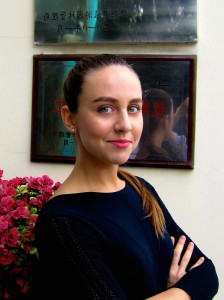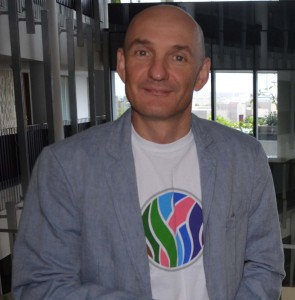 This is the thirteenth in the series of short statements from candidates in the forthcoming CODATA Elections. As a current CODATA Executive Committee member, DT Lee is seeking re-election. He is nominated by the CODATA Committee of Academia Sinica, Taipei.
This is the thirteenth in the series of short statements from candidates in the forthcoming CODATA Elections. As a current CODATA Executive Committee member, DT Lee is seeking re-election. He is nominated by the CODATA Committee of Academia Sinica, Taipei.
I would welcome this precious opportunity, representing CODATA Academia Sinica Taipei, to stand for the re-election to the CODATA Executive Committee. I have been personally involved with CODATA since 2007, serving as the Chair of CODATA, Academia Sinica, Taipei, until 2012, when I was elected to be a Member of the CODATA Executive Committee.
With the support of the General Assembly, following the 23rd CODATA Conference on “Open Data and Information for a Changing Planet” held in Taipei, in 2012, I was elected to serve on the Executive Committee. In the past two years as an EC Member, I have been involved in all dimensions of CODATA mission and served as the liaison to the Global Roads Task Group and to the Early Career Data Professionals (ECDP) Working Group on topics related to Data Science Capacity Building. I have encouraged the Global Roads Task Group to broaden usage scenarios of global ROADS Datasets, and supported ECDP discussions and development, addressing Data Science Capacity Building from CODATA’s perspective on a global level.
These activities are based on my past experience involving cultural heritage data preservation and dissemination of the Taiwan e-Learning and Digital Archives Program (TELDAP) for 12 years and interactions with international counterparts in North America (USA and Canada), Europe (Germany, Netherlands, Croatia and Ukraine), and South Africa.
Promoting New CODATA Initiatives in Cultural Heritage Data and Agriculture Data
With the expanded efficiency and agile leadership of the Secretariat, CODATA is now having deeper engagement with global scientific and data science community. Inspired by the ICSU Future Earth global research platform, if re-elected to serve on the Executive Committee, I would like to promote, connect and push forward, among other initiatives of CODATA, two major challenging tasks involving global culture heritage data and agriculture data.
Taiwan started to invest in digital preservation of culture heritage and the creative industries in 2002. During the decade-long national initiative, I served as the Deputy Program Director of TELDAP, sponsored by the National Science Council (now Ministry of Science and Technology). We had realized the power of information and communication technology (ICT) and utilized the Internet and Web to preserve and disseminate our cultural heritage and revitalize the past. So joining the respected European and Canadian colleagues in Canadian Heritage Information Network, Digital Cultural Content Forum & Culturemondo Network, Taiwan was one of the earliest participants of the global data commons with abundant collections and technologies. The global trend of “Linked Open Data” makes one step further and creates the “Deep / Data Web”. The cultural data such as those collected in Europeana.eu, Library of Congress National Digital Library Program of USA, TELDAP of Taiwan, and international museum networks, would re-shape the cultural landscape just as the Internet has done for us. Active minds with their creativity, professional training and collaboration experiences in cultural institutions, would be an important new strength to instil into CODATA community and enhance CODATA visibility.
Agriculture data, in my view, is another essential dimension for CODATA to connect with more disciplines, and involve many more countries. In some of the past Asia Pacific Advanced Network (APAN) meetings, Japanese colleagues had made efforts demonstrating and providing an insightful holistic vision to integrate agriculture, food and environment. For densely populated Asian countries, more governments and international organizations in this region are seeking to connect to one another with the help of the latest ICT development. How could CODATA play a more important role in engaging and connecting these efforts? Right now I am leading a Taiwanese agriculture-focused comprehensive university, and I have sensed this urgent need for global connection to change our world from the root and address the issues of sustainable development.
Promoting Open Source Software
I have been promoting the open source software movement with the establishment of an Open Source Software Foundry (OSSF) at the Academia Sinica, and open cultural data policy in the governmental level in Taiwan since 2002. We will invite Brazilian senior officer Jose Murilo (@josemurilo), Ministry of Culture in 2015 to share and exchange the 10 plus year experience of promoting Free Culture policy. In more than a decade, the progress of science is unleashing global societies in so many directions. As a witness and practitioner myself, I was elected Member of The World Academy of Sciences (TWAS) (2008), and was awarded Humboldt Research Award (2007), and appointed as Ambassador Scientist (2010) by the Alexander von Humboldt Foundation, Germany, and was a recipient of the Distinguished Alumni Educator Award, University of Illinois, Urbana-Champaign, Illinois, USA (2014). The awards connect me to broader communities, where I’d like to contribute and feedback to global society with a new data science vision.
Der-Tsai Lee’s Personal Profile
Dr. Der-Tsai Lee is Academician and Distinguished Research Fellow of the Institute of Information Science, Academia Sinica, and is currently on leave from Academia Sinica to serve in the capacity of President of National Chung Hsing University, Taiwan. He was the Chair and a Standing Committee Member of CODATA Taiwan National Committee since 2007 until 2012 when he was elected to be an Executive Committee Member of CODATA, International Council for Science.
He has held other positions as Distinguished Research Chair Professor, Department of Computer Science & Information Engineering, National Taiwan University, and Distinguished Chair Professor, Department of Computer Science and Engineering, National Chung Hsing University, Taiwan.
Recently he had led National Chung Hsing University, internationally well-known in agricultural science, to develop interdisciplinary collaborative research on agricultural big data. The integration of agriculture related environmental data, economic data, census and policy data, as well as biodiversity and genomic data in Taiwan, for example, could be a solid base for pursuing Asia wide international collaboration, where China, Japan, Thailand, Malaysia and other Asian countries have already held various conferences dealing with issues concerning sustainable agriculture in the past decade.
The decade long national initiative on digital cultural heritage, TELDAP, headquartered at Academia Sinica, is a crystal example of interdisciplinary collaboration between ICT and humanities and social sciences, encompassing digital archives and e-cultural data. His leadership in the past has set an exemplar of the collaboration among computer scientists and experts in natural science, humanities and social sciences. Serving as the liaison to the gROADS Task Group of CODATA, Dr. Lee got to know more about their work on geographic information science related work, and suggested that the Task Group include a new member, Prof. Ming-Der Yang, Director of the Center for Environmental Restoration and Disaster Reduction, National Chung Hsing University. With this addition, Taiwan’s environmental data related to natural disasters like earthquakes and typhoons, and technologies for sustainable development for disaster reduction, can be integrated. Those developments and endeavor are relevant to CODATA’s Strategic Plan 2013-18.
Dr. Lee helped establish the Research Center for Information Technology Innovation (CITI) of Academia Sinica, with a mission to facilitate cross-disciplinary collaboration between disciplines and between academia and industries. He continues to serve as a Standing Committee Member of CODATA National Committee, Academia Sinica, and forges the dialogue between IRDR, digital culture, science commons, and biodiversity resources, with a vision to encourage Linked Open Data enabled knowledge aggregation, analytics and data discovery.
As a globally well-respected senior scientist with international career trajectory, Dr. Lee would be able to involve and encourage stronger networking, collaboration and mutual support among CODATA National Members or International Scientific Unions and early career data professionals, in data policy, data citation, and data science and technologies. A more detailed biography of Dr. Lee can be found at http://www.codata.org/about-codata/executive-committee
 IUBS is delighted to have the opportunity to seek representation of the International Union of Biological Sciences on the CODATA Executive Committee. The new IUBS agenda is to promote ‘Unified Biology’, and we expect that biodiversity informatics will play a key role in achieving this goal. The development of infrastructure requires stable long-term funding, and community wide participation to provide the community as a whole with free, open, and relevant services. A close association with the CODATA through David Patterson’s participation in the Executive Committee will allow IUBS to call upon the expertise within CODATA to help guide the emergence of a unifying infrastructure for digital information, to strengthen the interactions within the bio cluster of ICSU, and help promote the biodiversity sciences within CODATA.
IUBS is delighted to have the opportunity to seek representation of the International Union of Biological Sciences on the CODATA Executive Committee. The new IUBS agenda is to promote ‘Unified Biology’, and we expect that biodiversity informatics will play a key role in achieving this goal. The development of infrastructure requires stable long-term funding, and community wide participation to provide the community as a whole with free, open, and relevant services. A close association with the CODATA through David Patterson’s participation in the Executive Committee will allow IUBS to call upon the expertise within CODATA to help guide the emergence of a unifying infrastructure for digital information, to strengthen the interactions within the bio cluster of ICSU, and help promote the biodiversity sciences within CODATA.








 Academic and Research Experience
Academic and Research Experience